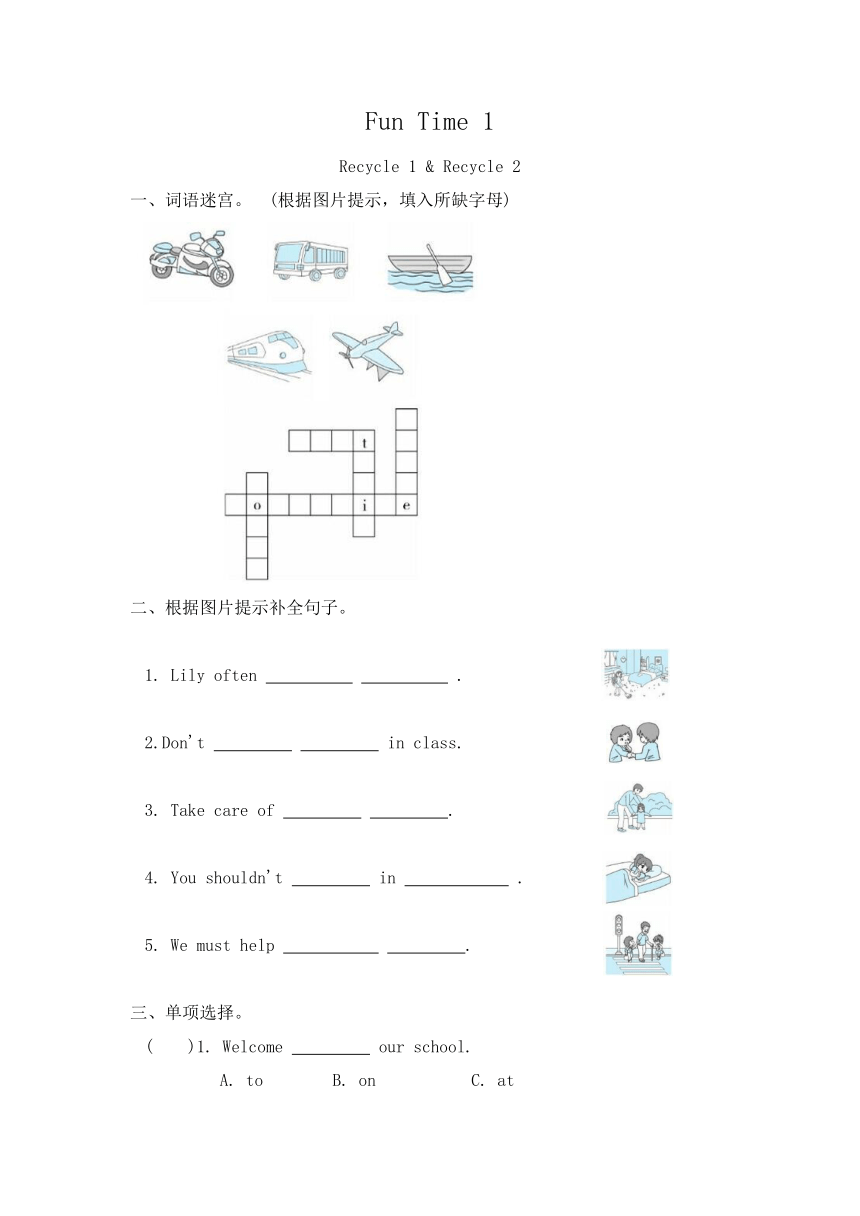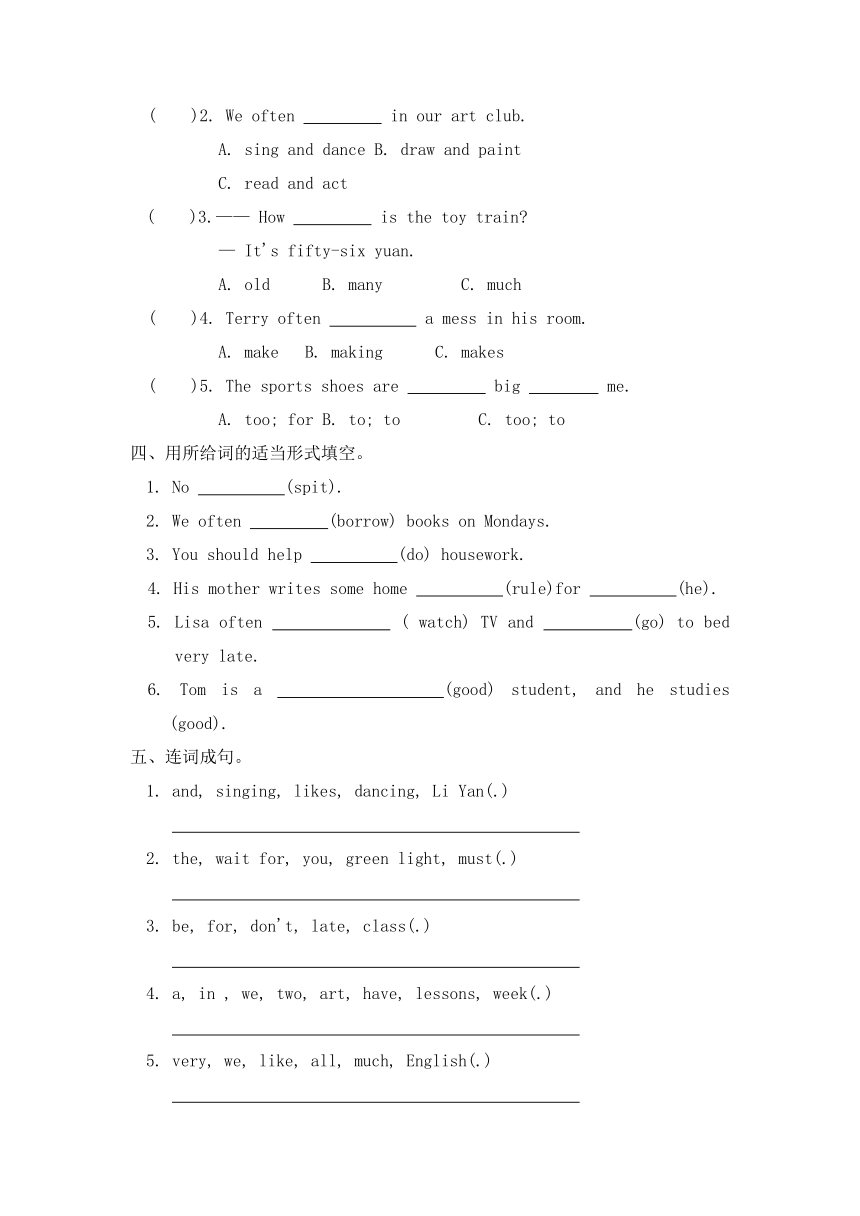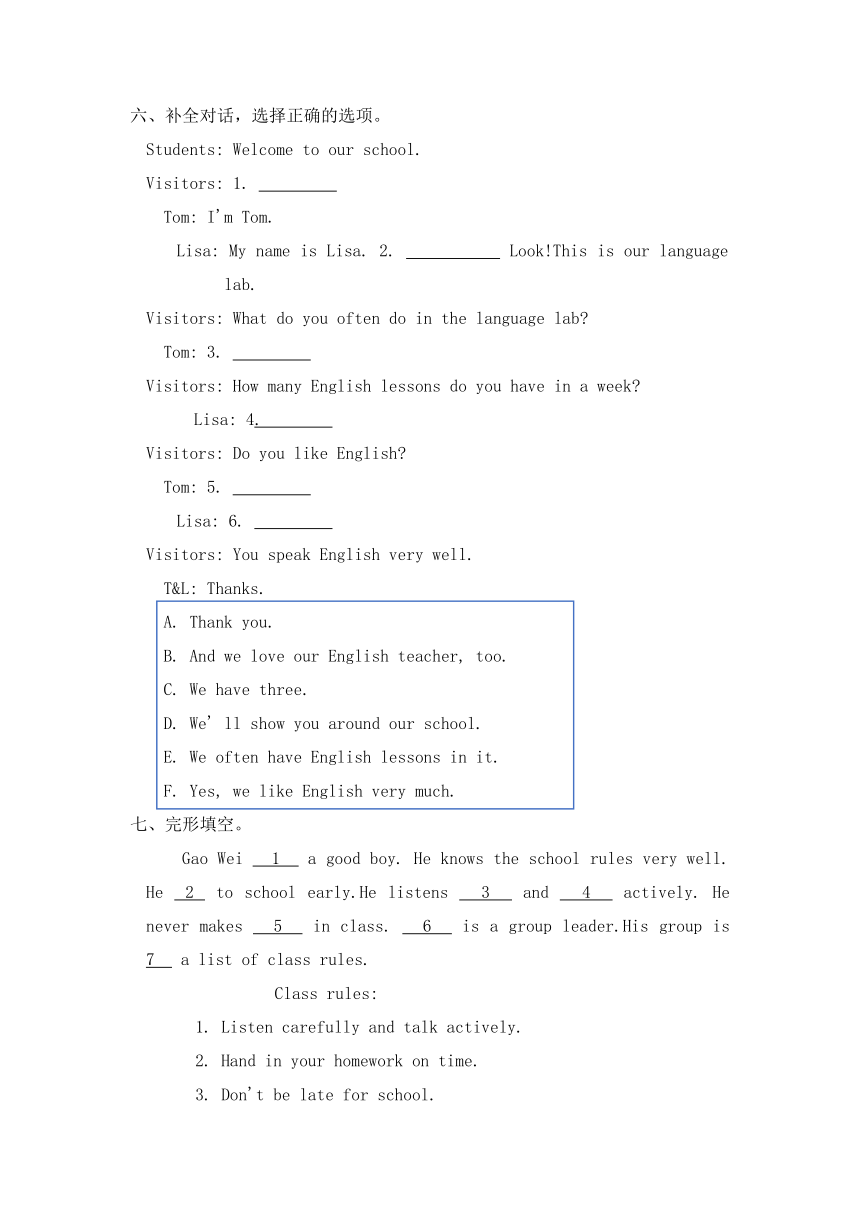Fun Time 1 Recycle 1 & Recycle 2同步练习(含答案)
文档属性
| 名称 | Fun Time 1 Recycle 1 & Recycle 2同步练习(含答案) |

|
|
| 格式 | docx | ||
| 文件大小 | 63.0KB | ||
| 资源类型 | 教案 | ||
| 版本资源 | 人教精通版(三年级起点) | ||
| 科目 | 英语 | ||
| 更新时间 | 2025-04-12 00:00:00 | ||
图片预览



文档简介
Fun Time 1
Recycle 1 & Recycle 2
一、词语迷宫。 (根据图片提示,填入所缺字母)
二、根据图片提示补全句子。
1. Lily often .
2.Don't in class.
3. Take care of .
4. You shouldn't in .
5. We must help .
三、单项选择。
( )1. Welcome our school.
A. to B. on C. at
( )2. We often in our art club.
A. sing and dance B. draw and paint
C. read and act
( )3.—— How is the toy train
— It's fifty-six yuan.
A. old B. many C. much
( )4. Terry often a mess in his room.
A. make B. making C. makes
( )5. The sports shoes are big me.
A. too; for B. to; to C. too; to
四、用所给词的适当形式填空。
1. No (spit).
2. We often (borrow) books on Mondays.
3. You should help (do) housework.
4. His mother writes some home (rule)for (he).
5. Lisa often ( watch) TV and (go) to bed very late.
6. Tom is a (good) student, and he studies (good).
五、连词成句。
1. and, singing, likes, dancing, Li Yan(.)
2. the, wait for, you, green light, must(.)
3. be, for, don't, late, class(.)
4. a, in , we, two, art, have, lessons, week(.)
5. very, we, like, all, much, English(.)
六、补全对话,选择正确的选项。
Students: Welcome to our school.
Visitors: 1.
Tom: I'm Tom.
Lisa: My name is Lisa. 2. Look!This is our language lab.
Visitors: What do you often do in the language lab
Tom: 3.
Visitors: How many English lessons do you have in a week
Lisa: 4.
Visitors: Do you like English
Tom: 5.
Lisa: 6.
Visitors: You speak English very well.
T&L: Thanks.
A. Thank you.
B. And we love our English teacher, too.
C. We have three.
D. We' ll show you around our school.
E. We often have English lessons in it.
F. Yes, we like English very much.
七、完形填空。
Gao Wei 1 a good boy. He knows the school rules very well. He 2 to school early.He listens 3 and 4 actively. He never makes 5 in class. 6 is a group leader.His group is 7 a list of class rules.
Class rules:
1. Listen carefully and talk actively.
2. Hand in your homework on time.
3. Don't be late for school.
4. 8 make noise in class.
( )1. A. am B. is C. are
( )2. A. come B. coming C. comes
( )3. A. care B. careful C. carefully
( )4. A. talks B. talking C. talk
( )5. A. sound B. voice C. noise
( )6. A. He's B. He C. She
( )7. A. make B. making C. makes
( )8. A. Don't B. Be C. Not
八、阅读对话,回答问题。
Salesman: Welcome to our toy shop! What can Ido for you
Peter: I want to buy some toy ships.
Salesman: There are many kinds of toy ships.Which one do you like
Peter: Would you please show me that big one
Salesman: OK. This toy ship is the biggest one in our shop.
Kate: Wow! It is so big.
Peter: Yes, I like it very much. Please show me that green one.
Salesman: Here you are.
Kate: It looks nice, too. How much is the green one
Salesman: It's thirty yuan. And the big one is forty yuan.
Peter: I' ll take them. Here's the money.
Salesman: Thank you. Goodbye!
1. What does Peter want to buy
He wants to buy .
2. Are there any toy ships in the shop
, there .
3. How much is the big one
yuan.
4. How much are the big one and the green one
yuan.
5. How many toy ships does Peter take
take s .
参考答案:
一、
二、1. does housework 2. make noise 3. young children
4. read; bed 5. old people
三、1. A 点拨: welcome to 欢迎来到。
2. B 点拨: art club“美术俱乐部”,故选择B。
3. C 点拨:本题考查固定搭配词组,how old多大年龄;how many多少; how much 多少钱。根据答句 It's fifty-six yuan,故选择C。
4. C
5. A 点拨: too“非常”,修饰形容词!big; for“对于”。故选择A。
四、1. spitting 2. borrow 3. to do 4. rules; him
5. watches; goes
6. good; well
方法点拨:此题用抓关键词法。例如:题目5 中抓到关键词 often,表示动作经常发生,时态是一般现在时,第三人称单数作主语时,watch变为 watches。同类标志词还有: always总是; usually通常; sometimes有时等。
五、1. Li Yan likes singing and dancing.
2. You must wait for the green light.
3. Don't be late for class.
4. We have two art lessons in a week.
5. We all like English very much.
六、1. A 2. D 3. E 4. C 5. F 6. B
七、1. B 2. C 3. C 4. A 5. C 6. B 7. B 8. A
八、1. some toy ships 点拨:由“I want to buy some toy ships.”可知。
2. Yes; are 点拨:由“There are many kinds of toy ships.”可知。
3. It's forty 点拨:由“And the big one is forty yuan.”可知。
4. They' re seventy 点拨:由“It's thirty yuan. And the big one is forty yuan.”可知。
5. He; two 点拨:由“I’ ll take them.”可知。
Recycle 1 & Recycle 2
一、词语迷宫。 (根据图片提示,填入所缺字母)
二、根据图片提示补全句子。
1. Lily often .
2.Don't in class.
3. Take care of .
4. You shouldn't in .
5. We must help .
三、单项选择。
( )1. Welcome our school.
A. to B. on C. at
( )2. We often in our art club.
A. sing and dance B. draw and paint
C. read and act
( )3.—— How is the toy train
— It's fifty-six yuan.
A. old B. many C. much
( )4. Terry often a mess in his room.
A. make B. making C. makes
( )5. The sports shoes are big me.
A. too; for B. to; to C. too; to
四、用所给词的适当形式填空。
1. No (spit).
2. We often (borrow) books on Mondays.
3. You should help (do) housework.
4. His mother writes some home (rule)for (he).
5. Lisa often ( watch) TV and (go) to bed very late.
6. Tom is a (good) student, and he studies (good).
五、连词成句。
1. and, singing, likes, dancing, Li Yan(.)
2. the, wait for, you, green light, must(.)
3. be, for, don't, late, class(.)
4. a, in , we, two, art, have, lessons, week(.)
5. very, we, like, all, much, English(.)
六、补全对话,选择正确的选项。
Students: Welcome to our school.
Visitors: 1.
Tom: I'm Tom.
Lisa: My name is Lisa. 2. Look!This is our language lab.
Visitors: What do you often do in the language lab
Tom: 3.
Visitors: How many English lessons do you have in a week
Lisa: 4.
Visitors: Do you like English
Tom: 5.
Lisa: 6.
Visitors: You speak English very well.
T&L: Thanks.
A. Thank you.
B. And we love our English teacher, too.
C. We have three.
D. We' ll show you around our school.
E. We often have English lessons in it.
F. Yes, we like English very much.
七、完形填空。
Gao Wei 1 a good boy. He knows the school rules very well. He 2 to school early.He listens 3 and 4 actively. He never makes 5 in class. 6 is a group leader.His group is 7 a list of class rules.
Class rules:
1. Listen carefully and talk actively.
2. Hand in your homework on time.
3. Don't be late for school.
4. 8 make noise in class.
( )1. A. am B. is C. are
( )2. A. come B. coming C. comes
( )3. A. care B. careful C. carefully
( )4. A. talks B. talking C. talk
( )5. A. sound B. voice C. noise
( )6. A. He's B. He C. She
( )7. A. make B. making C. makes
( )8. A. Don't B. Be C. Not
八、阅读对话,回答问题。
Salesman: Welcome to our toy shop! What can Ido for you
Peter: I want to buy some toy ships.
Salesman: There are many kinds of toy ships.Which one do you like
Peter: Would you please show me that big one
Salesman: OK. This toy ship is the biggest one in our shop.
Kate: Wow! It is so big.
Peter: Yes, I like it very much. Please show me that green one.
Salesman: Here you are.
Kate: It looks nice, too. How much is the green one
Salesman: It's thirty yuan. And the big one is forty yuan.
Peter: I' ll take them. Here's the money.
Salesman: Thank you. Goodbye!
1. What does Peter want to buy
He wants to buy .
2. Are there any toy ships in the shop
, there .
3. How much is the big one
yuan.
4. How much are the big one and the green one
yuan.
5. How many toy ships does Peter take
take s .
参考答案:
一、
二、1. does housework 2. make noise 3. young children
4. read; bed 5. old people
三、1. A 点拨: welcome to 欢迎来到。
2. B 点拨: art club“美术俱乐部”,故选择B。
3. C 点拨:本题考查固定搭配词组,how old多大年龄;how many多少; how much 多少钱。根据答句 It's fifty-six yuan,故选择C。
4. C
5. A 点拨: too“非常”,修饰形容词!big; for“对于”。故选择A。
四、1. spitting 2. borrow 3. to do 4. rules; him
5. watches; goes
6. good; well
方法点拨:此题用抓关键词法。例如:题目5 中抓到关键词 often,表示动作经常发生,时态是一般现在时,第三人称单数作主语时,watch变为 watches。同类标志词还有: always总是; usually通常; sometimes有时等。
五、1. Li Yan likes singing and dancing.
2. You must wait for the green light.
3. Don't be late for class.
4. We have two art lessons in a week.
5. We all like English very much.
六、1. A 2. D 3. E 4. C 5. F 6. B
七、1. B 2. C 3. C 4. A 5. C 6. B 7. B 8. A
八、1. some toy ships 点拨:由“I want to buy some toy ships.”可知。
2. Yes; are 点拨:由“There are many kinds of toy ships.”可知。
3. It's forty 点拨:由“And the big one is forty yuan.”可知。
4. They' re seventy 点拨:由“It's thirty yuan. And the big one is forty yuan.”可知。
5. He; two 点拨:由“I’ ll take them.”可知。
同课章节目录
- Unit 1 Welcome to our school!
- Lesson 1
- Lesson 2
- Lesson 3
- Lesson 4
- Lesson 5
- Lesson 6 Revision
- Unit 2 Can I help you ?
- Lesson 7
- Lesson 8
- Lesson 9
- Lesson 10
- Lesson 11
- Lesson 12 Revision
- Unit 3 We should obey the rules.
- Lesson 13
- Lesson 14
- Lesson 15
- Lesson 16
- Lesson 17
- Lesson 18 Revision
- Unit 4 What's wrong with you?
- Lesson 19
- Lesson 20
- Lesson 21
- Lesson 22
- Lesson 23
- Lesson 24 Revision
- Fun Time 1
- Recycle 1
- Recycle 2
- Fun Reading
- Unit 5 I’m cleaning my room.
- Lesson 25
- Lesson 26
- Lesson 27
- Lesson 28
- Lesson 29
- Lesson 30 Revision
- Unit 6 We’re watching the games.
- Lesson 31
- Lesson 32
- Lesson 33
- Lesson 34
- Lesson 35
- Lesson 36 Revision
- Fun Time 2
- Recycle 1
- Recycle 2
- Fun Reading
- 旧版资料
- Unit 1 Do you like young animals?
- Unit 2 They are hens and chicks.
- Unit 4 Is there a library in your class?
- Unit 5 How much is it?
